
If you're planning to start selling on eBay, then explore this detailed guide which explains on how to sell on eBay and on how you can grow your business.
Today, eCommerce is essential to our everyday life. It is changing how business is done all across the world. eCommerce has changed significantly over time.
Technological advancement has made it possible for customers to shop from the convenience of their homes and have their products delivered straight to their front doors.
And the trend is only going upwards. This year, it was reported there were 2.14 billion online shoppers all over the world. This gives individuals the opportunity to start their own online shop and capitalize on the increased demand. There are a lot of eCommerce platforms available for them to set up a shop and eBay is one of the popular online market places.
eBay has been a leader in the online marketplace since its inception in 1995, one year after Amazon.
Even though eBay is popularly known and started as an online auction house where people could buy and sell old goods and collectibles, brand new items are now being sold successfully there as well.
In this eBay selling guide, we will explain everything you need to know to start selling on the platform and to grow your business. If you’re planning to start selling on eBay, this guide is for you.
Is it hard to Sell on eBay?
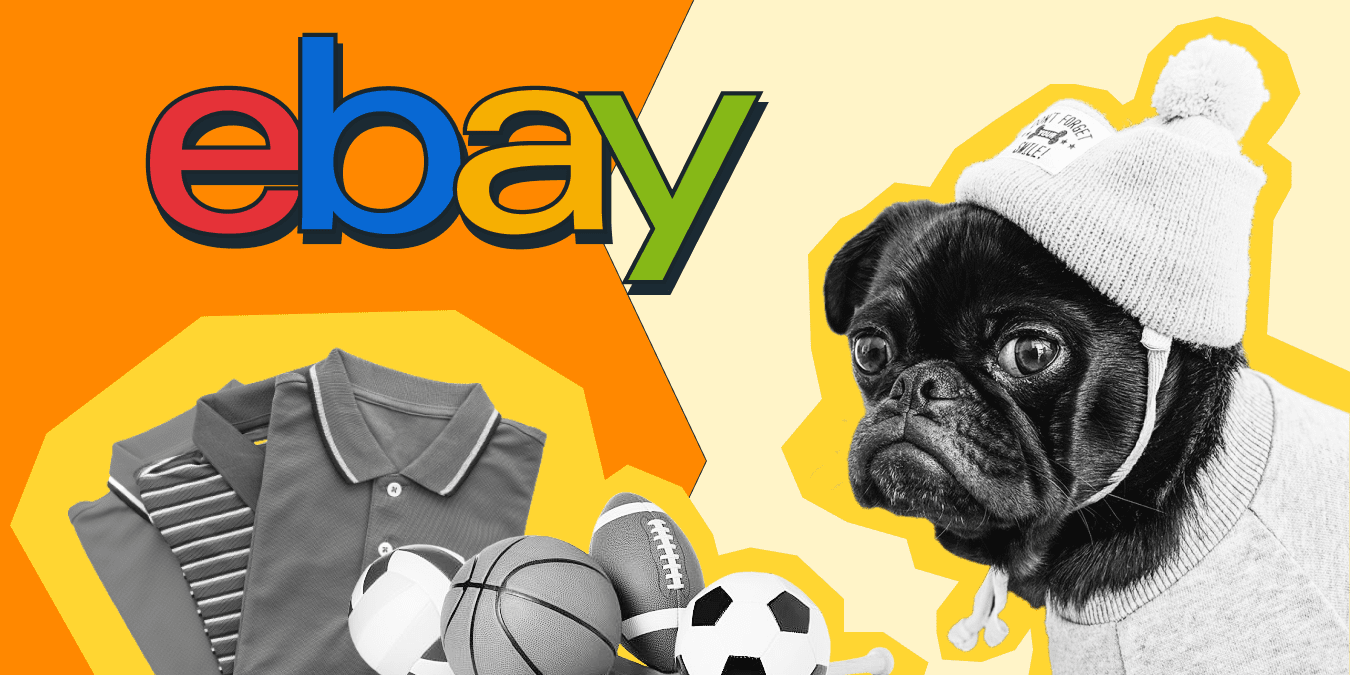
The most common question asked is, how difficult is it to sell on eBay? Well, the process of selling on eBay is simple enough that just about anyone can do it.
Setting up a shop on eBay is straightforward when you’re starting out, however as you go along optimizing and managing your shop may take a little more time.
Similar to traditional businesses, selling on eBay only becomes more challenging with the growth of your business. However, there are many resources available online similar to this to help you along the way.
How to sell on eBay for Beginners?
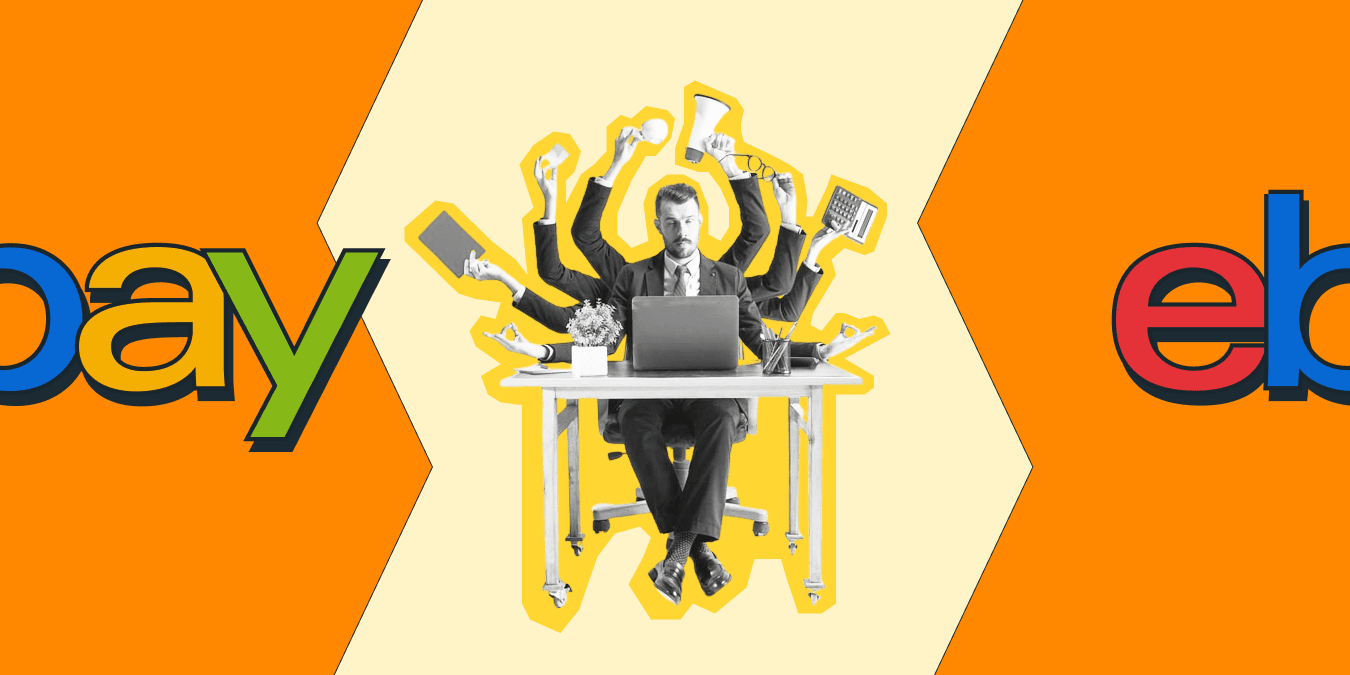
Where do you begin? Starting your own business journey can be intimidating if you don’t have any prior selling experience. However, that is exactly why eBay is such a great platform to start with.
Selling on eBay has the benefit of allowing you to start small. Have a look around your home; I’m sure you have some unused items like outdated gadgets, books, or toys. You don’t have to invest anything initially in the goods you want to sell.
But before you can do anything else, you need to take care of the account creation process. You’ll find a detailed breakdown of the registration procedure and its unique features in this section.
How to start selling on eBay: Decide your business model
Before you even set up a shop on eBay you think about your business model. Your eBay seller account will also depend on which business model you decide on. Here are a few business models which work well on eBay.
Wholesale
You can purchase items to sell in bulk to take advantage of lower unit costs offered by manufacturers or distributors. Wholesale products are available either from the manufacturers themselves or via online or local wholesale marketplaces. With this type of business setup, you’ll need more space for storage than with others and invest a little bit of money as well.
Dropshipping
Dropshipping is the trending business structure these days and here’s why.
Basically, you’ll be ordering goods from a wholesaler, who will then ship them out to your end consumers. By eliminating the need to stock goods, this company structure reduces overhead expenses. When selling on eBay, you cannot use any other marketplace or merchant as a dropshipping source because of eBay’s rules.
Resale Used products
You can sell used valuable items lying around your house on eBay for profit. This method is very common, most people sell their used furniture, electronics, tools, etc they no longer need on eBay. Another way to acquire used products is by visiting your local used items marketplace. You can buy cheap used products from there and sell them later on eBay.
Retail
Involves acquiring goods at low costs with the intention of reselling them on eBay for a profit. To engage in retail arbitrage, all you need to do is take advantage of two or more pricing differences in separate markets.
Private Labels
Private-label goods are manufactured exclusively for your business under your label. White labeling is the practice of purchasing a manufacturer’s generic goods for resale under one’s own brand name.
There is significant potential for profit with white-labeled items, but doing so requires significant work. Private labeling lets you make a unique offering, but it typically costs more money.
How to set up an eBay account to Sell?
Once you’ve decided on your business model to pursue your business, it’s time to set up your eBay account. There are two types of seller accounts on eBay. You may set up a business account to sell things, or you can use your personal account to do so.
Personal account: According to eBay’s terms of service, personal accounts are intended for occasional buyers and sellers. A personal account is ideal for people who wish to sell one-of-a-kind things or commodities with limited quantities.
Business account: The business eBay account is designed for sellers who:
- Sell items that are bought for resale
- Manufacture products and sell them to make a profit
- Regularly sell a large number of goods
- Buy items for their businesses
A business account on eBay provides useful tools to help you grow your business. You can also add an account manager to help manage your account and sales on eBay. This feature is exclusive to Business accounts.
It is a good practice to create a Business account for your eCommerce operations.
To create your seller account, go to eBay website and click on “register” in the top left corner of the menu bar.
Next, you’ll have to choose between a personal or business account choice. As explained earlier, if you want to sell products casually choose the personal account otherwise select the business account.
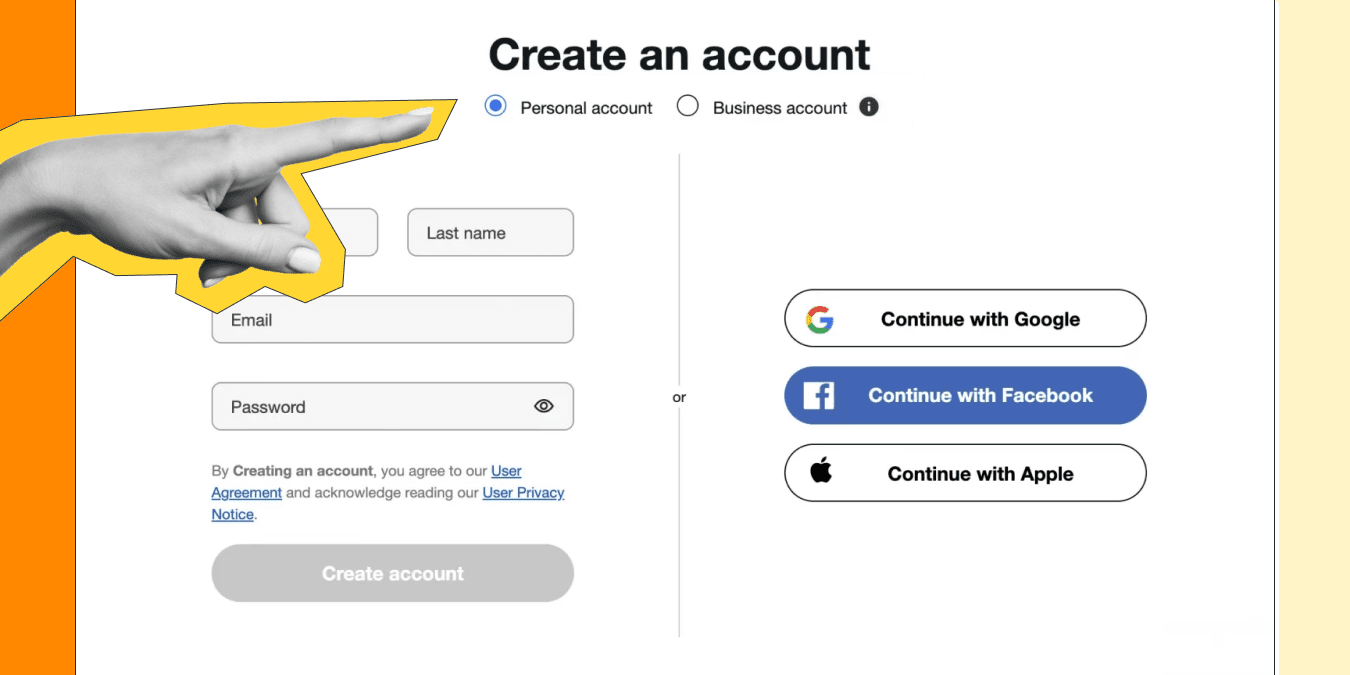
If you opt for a business account, you’ll have to pick a business name for your shop and your business location. Your business name will be displayed to everyone interacting with your store, so pick something professional.
After registering your business name, you’ll be asked to choose a payment method for your business activities, such as a bank account, Paypal, a credit card, or a debit card.
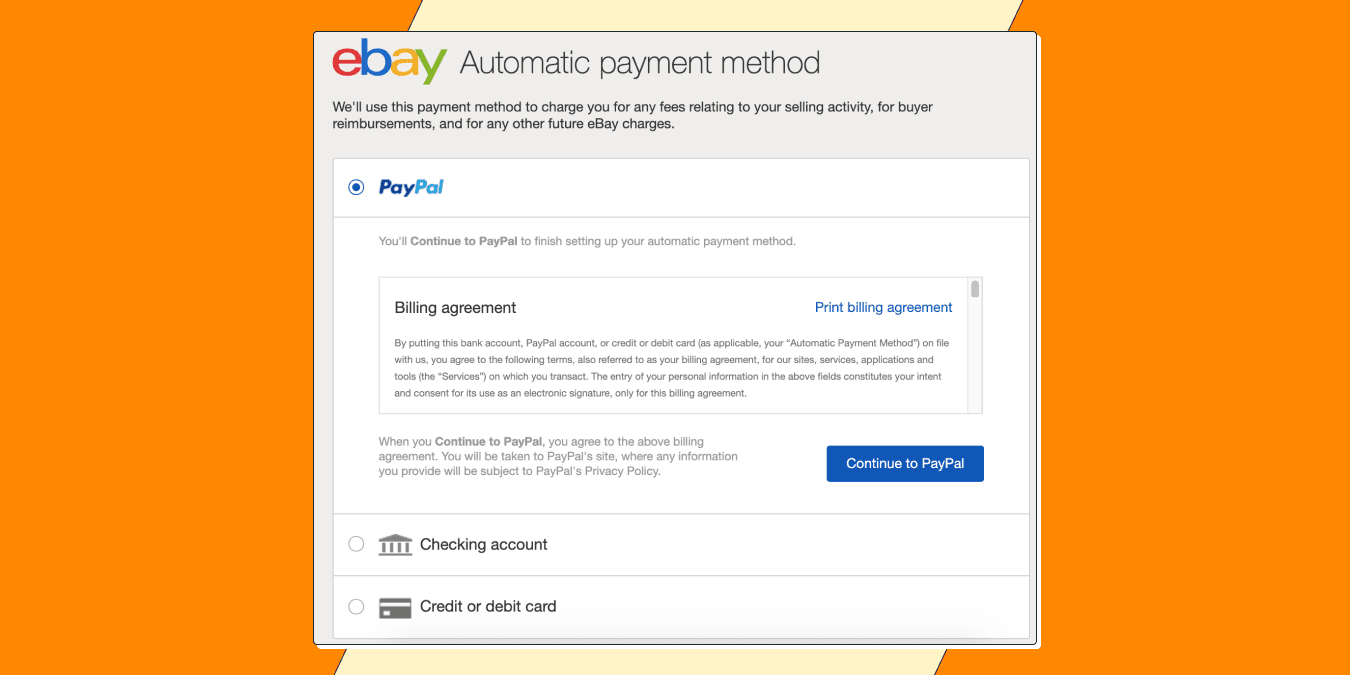
The payment options may differ depending on your country. Read eBay’s payment policy guidelines to check which payment methods work in the country you’re operating from.
How to list an item on eBay?
Now that you’ve learned how to set up your eBay account. We will answer the next big question: How to list an item on eBay? eBay is a very user-friendly marketplace and the process of listing items is simpler than you’d expect.
To begin listing, click on “Sell” on the top right corner of the website.
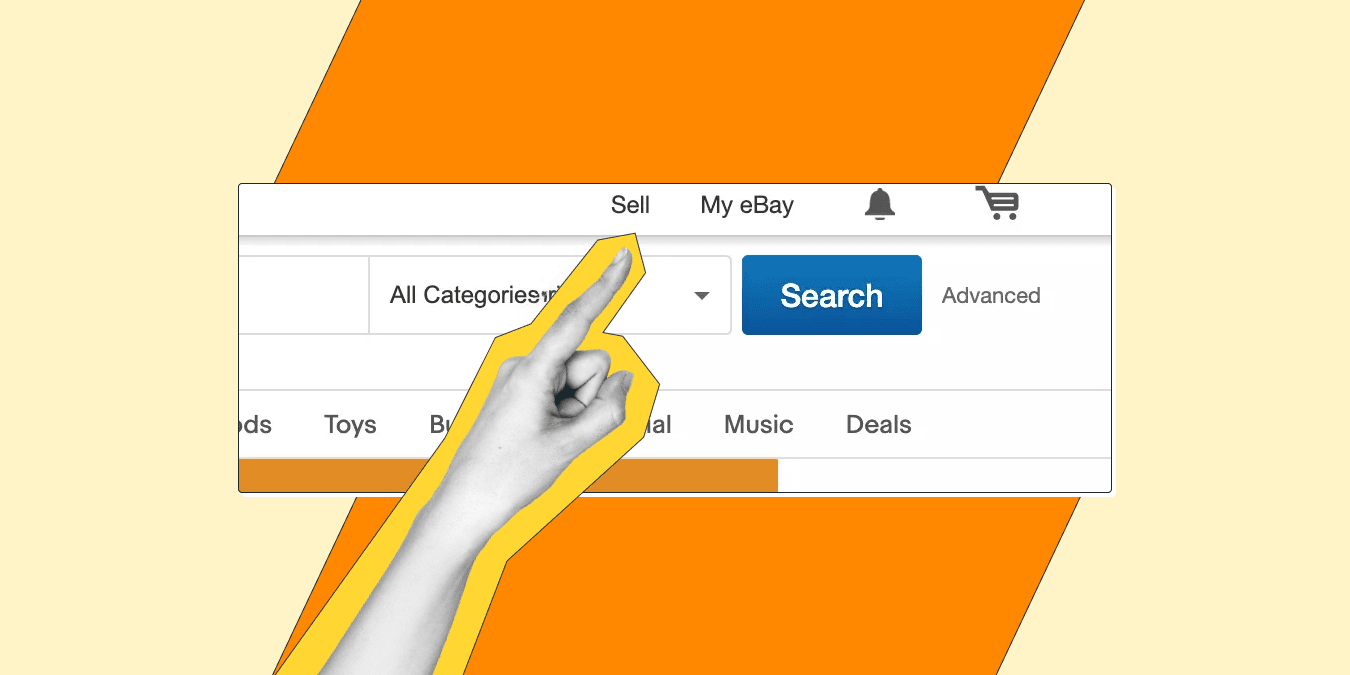
The platform offers two methods to list an item for sale. Additionally, you can try eBay listing tool to make the process easier for yourself.
eBay quick listing: This method is good for your first item listing as it provides suggestions for pricing and shipping based on the prior sales information of similar items.
You can find the relevant listing categories for your products with the quick listing feature. Simply enter the keywords which provide the most relevant description of your product in the search bar and the quick listing tool will sort it for you.
Additionally, you can also use UPC, ISBN and MPN codes. You might be wondering what is MPN on eBay? In short, MPN are unique item identifier codes issued by manufacturers which are used to keep track of inventory. Let’s take a look at an example to see how the keyword listing works.
Let’s say you want to list a Nike men’s shoe. Just enter “Nike men’s shoe” in the search bar. eBay will start suggesting similar products matching the description.
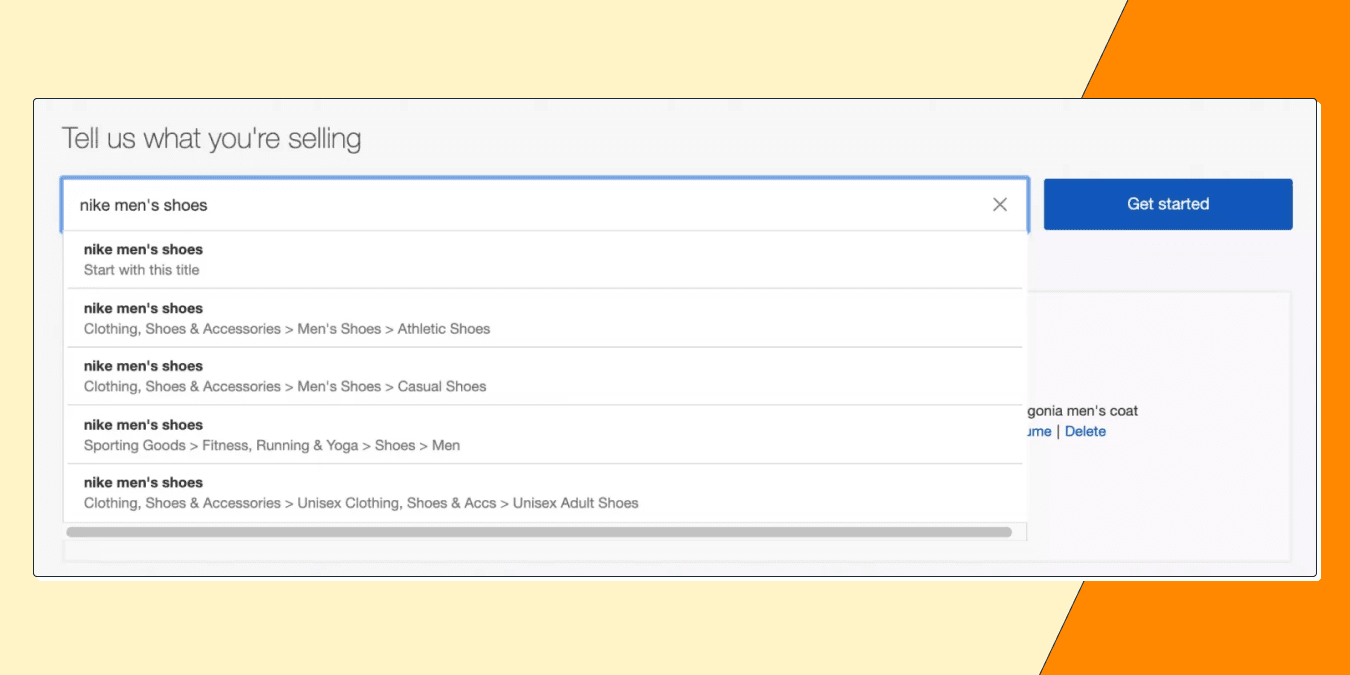
Select the one that matches your product and it will automatically fill in the information from the matching listing. Then customize it if you want to add or remove any information specific to your product.
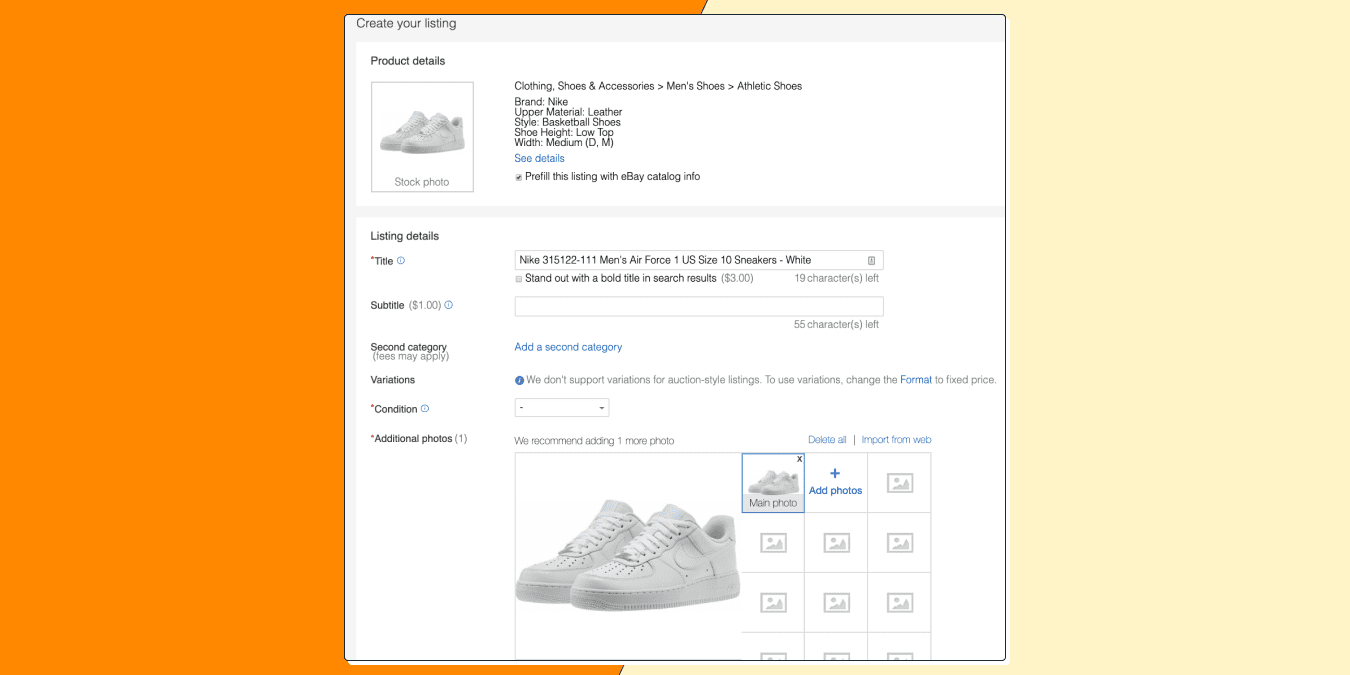
Advance listing: If you want to sell on eBay more frequently this option is ideal for it. It allows you to handle large volumes of inventory and offers additional features.
When using the advanced listing form to list products, simply enter the keywords in the search bar and click get started. Additionally, It is possible to locate a product without knowing its primary keywords. Simply click Browse categories and then choose the main category and any subcategories that apply to your product.
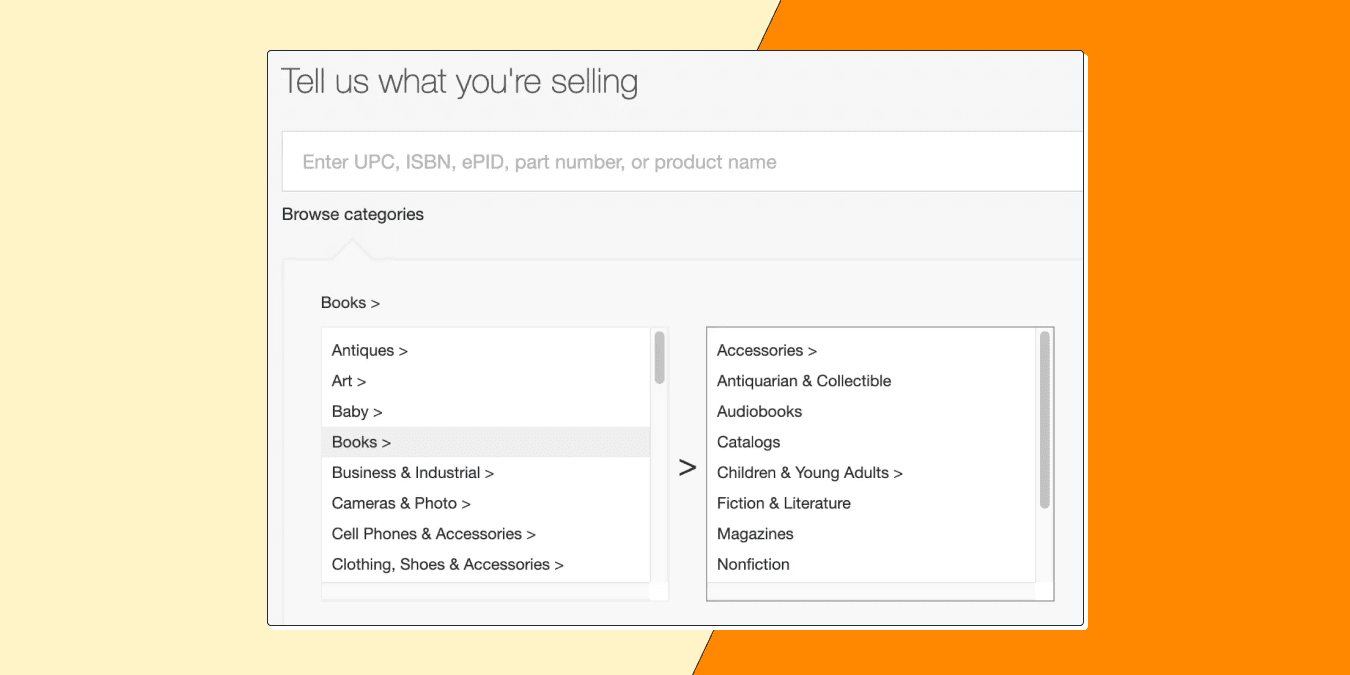
After you’ve made your selections, a form with many sections to complete will appear:
- Title
- Codes used to identify products, such as UPC, MPN, ISBN, etc.
- Detailed information on the item, such as its size, brand, version, shade/color, etc.
- 12 HQ pictures of the product.
- Product description.
You may go on to the next phase now that your product details are complete.
Next, decide whether you’d want to sell on eBay using an auction or a fixed price.
Auction style listing: As the name suggests, in auction-style listing buyers bid for the item in the given time frame set by you. To encourage bidding wars and increase sales, you may set the item’s minimum acceptable offer price or include a “accept the best offer” button. A fixed price can be established for auction-style listing, but it should be at least 30% more than the beginning bid.
An auction-style listing is the best way to go when you’re not sure how much your item is worth, you need to sell it quickly, or it’s a really rare and/or unique item.
Fixed-Price or Buy-Now style listing: You set a fixed price for the item and whoever buys first gets the items. This listing is ideal for when you know the exact value of the item you’re selling or when selling a large volume of inventory.
Select whichever style suits your product and business model. There are a few guidelines that you need to keep in mind while listing items. We will cover that next.
Listing rules for selling on eBay
Here are a few key rules that every seller needs to follow for selling on eBay.
- On eBay, you may only sell physical items or tangible services. Blank listings, or listings that don’t provide a product or service, are prohibited since they raise the risk of fraud and confuse potential purchasers.
- You should create your own descriptions and use your own photographs, or use the ones provided by eBay in its catalog. This is to ensure you’re giving potential buyers an accurate depiction of your products and aren’t infringing on anybody else’s content rights.
- It is against eBay’s policies to use trendy search terms that have nothing to do with your products as part of your listing descriptions.
- Use one fixed price when listing identical products. It is against eBay’s policy to list the same product with different pricing to manipulate the market.
- You must provide clear and accurate information about the product’s location in the listing to ensure that buyers have a full idea of shipping costs and expected delivery timelines.
eBay selling preferences
A larger pool of prospective purchasers increases your product’s exposure and, thus, its sales potential. But there might be some situations where you want to avoid certain kinds of buyers. To manage your business operations better you can block eBay buyer by using the buyer requirement feature.
However, your product listing will still be visible to everyone including eBay buyers you’ve blocked, but they will be unable to place bids or make purchases.
Buyer Requirements allow you to block buyers who:
- have a history of having purchases canceled because they failed to pay.
- Have a delivery address in countries you don’t want to ship to.
How to sell on eBay for free?
You can sell on eBay for free with either of the two seller accounts. There is no cost associated with running your seller accounts on the platform. However, eBay will only charge a small fee for the listing and a transaction fee when the item is sold.
These costs are common on every eCommerce platform. You can opt for a monthly paid subscription when your business grows to take advantage of the marketing and sales boost offered by the platform. The upgrade isn’t necessary if you want to stick with your seller account.
What to sell on eBay?
The great thing about eBay is you can sell pretty much anything on the platform as long as it’s legal. You can sell used items from your own house such as furniture, books, and electronics. Or buy products from a wholesaler and resell them on eBay. In the eBay selling guide, we will explain how to decide which products to sell on eBay and where to look for them.
Things to consider when deciding what to sell on eBay
You may already have an idea of what you want to sell on eBay. However, if you still haven’t made up your mind, here are a few things to consider when deciding what to sell on eBay.
Profitability
If you’re planning to sell products that you’ve bought from the retail or wholesale market make sure that you can earn more than you’ve invested. Furthermore, when doing the math, don’t forget to include in the selling fees charged by eBay.
Demand
Research eBay’s trending products as well as other data provided by the platform such as buyer’s wishlists. Finding out what the consumers need will help you fill the vacuum in the marketplace. Knowing the demand of the marketplace is a good way to target new consumers and turn them into permanent buyers.
Competition
Study the competition in the marketplace. And that includes platforms other than eBay. Researching for competitors in the eCommerce business is a good practice since it provides the important information you need to come up with new product ideas, decide on pricing, predicate inventory turnover, etc. Find products that have fewer suppliers because it is easier for beginner sellers to compete in a low-competition market.
What to sell on eBay: how to find high-selling products?
We live in a world where information is readily available. You don’t have to spend money to do your research. There are plenty of resources available for free to find products you can sell on eBay.
Google Trends
The best place to look for trending and popular products to sell is Google trends. You can find out what products online shoppers are searching for on various search queries in Google across different languages and regions.
eBay trending products
Keep an eye on new and trending products on eBay. It is a good way to figure out which products are high in demand.
Trending products on other eCommerce platforms
Look for top-selling items on other eCommerce platforms. You can profit greatly if the top selling products on other shopping platforms are not being sold on eBay.
Online social network communities
If you want to target a niche market, online communities are a great place to find products you can sell on eBay. Selling niche products is a great way to start for beginner sellers since it is not a profitable market for big sellers.
What to sell on eBay: Product ideas
The eCommerce industry has changed a lot over the years. New and niche product categories are gaining popularity in online shopping. You can sell anything on eBay as long as it is possible to ship the product. If you’re still wondering what to sell on eBay, here is a list of categories with top selling products on eBay.
- Household products: cleaning products, lamps, bulbs, house tools, etc.
- Health-care and beauty products: hair brushes, gels, fitness bands and mats, etc.
- Mobile accessories: mobile covers, mobile protectors, earphones, charging cables, etc.
- Electronics: hair dryer, appliance remotes, LED lights, sound systems, etc.
- Pet supplies: pet grooming supplies, dog houses, and beds, cat litter box, dog collars, etc.
How to sell on eBay: Growth Tips
Once you’ve set up your eBay account and start selling on eBay, your next focus should be on how to grow your business. There are a lot of sellers on eBay and the competition can be very rough. But how can you stand out from competitors and maximize your sales?
We’ve prepared a list of best-performing tips to help you get a competitive edge over your competitors with little investment and boost your sales.
Trustworthiness
There are so many sellers on eBay that are selling similar products. How do customers decide which one to buy? Buyers prefer sellers whom they can trust, so building a positive relationship with your buyers is essential.
Positive feedback from buyers is one of the best ways to build your reputation as a reliable eBay seller. Gaining traction in the market and the confidence of potential clients is directly proportional to the number of favorable evaluations you receive.
Providing a memorable and satisfying experience for customers is the greatest method to earn their praise. Selling low-priced, frequently-replaced products can also boost consumer satisfaction and favorable reviews.
Get creative with the graphics
Customers pay the most attention to product photos while doing an online search. It is their first interaction with your product, and making sure product photos attract buyers is important. Better conversion rates are guaranteed with higher quality product photos. Make use of these strategies to make them more appealing:
- Enhance your image quality so that they resemble those taken by an expert.
- Create detailed, multi-angle images of your goods.
- Keep them real, photograph your items as they would appear in actual use. That is, if you are trying to sell clothing, include examples of how the garments might appear on a person.
Investigate selling limits
eBay is a fan of limitations in general, but it especially enjoys imposing them on new sellers. They have the potential to be a roadblock in your eBay business plan. Limits are in place to help sellers build and maintain a solid reputation on eBay. Limits on accounts, categories and individual goods are a fact of life for new sellers on eBay. Before you start operating on the market, you need to be aware of these selling restrictions.
Caution with High-Risk products
High-risk items such as smartphones, designer purses, apparel, shoes, electronics, and event tickets. eBay closely monitors sellers who sell these high-risk products on their platform, as they are frequently used in fraudulent activities. If you want to sell these products you must establish a solid reputation as a seller before attempting to sell them.
Keep in mind that if you sell a phony designer item on eBay, you won’t get another opportunity. eBay takes serious action against sellers who fraud their customer base. Even if this happens for the first time, the marketplace will automatically suspend the seller’s account without warning.
Consider Free Shipping
Amongst sellers online, free delivery is the most hotly contested issue. Because the response is conditional on the specifics of the situation, it cannot be given categorically. Unfortunately, “free delivery” rarely is. Online stores have to factor the cost of delivery into their prices or risk a dip in revenue.
Large and heavy items have unpredictable shipping costs. If your consumers are located in far-flung areas or if you charge a premium for delivery, it’s best to avoid supplying such items with free shipping. If you have not already factored this cost into the selling price, you will need to do so now.
Handle packaging yourself
Packaging is one of the key elements in the eCommerce business. As a seller, it is your responsibility to ensure that the things you offer are functional when they reach the end user. To achieve this goal, it is essential to always use high-quality packaging when sending out goods and avoid cost-cutting with cheaper packaging.
Introduce return policy
As an eBay seller, you may get more credibility by allowing customers to return their products. There won’t be as many returns to deal with if your goods are first-rate. In addition, eBay often denies returned items since most customers don’t bother to send their products back.
Make your own guidelines clear in a Return Policy that you write. To prevent receiving things that have been used and then returned, specify in your regulations that only items in original condition and packing can be returned.
Recover fees from canceled transactions
A final value fee is deducted from the total amount you get from your auction’s bidders before eBay takes its cut. Unfortunately, there are times when buyers back out of their purchases.
You can claim reimbursement for these costs through eBay. Manually or by using the “Unpaid Item Assistant,” both methods will result in a refund.
Register for eBay’s free listing alerts
eBay offers a certain amount of free listing to its sellers. There is no insertion fee charged on these listings. Which is a great way to increase your profits when you’re starting out. It gets better, eBay offers additional free listings very frequently.
You should take advantage of these free listings. Wait for the announcements of such offers if you have a product you can keep in stock and put on eBay later. You can avoid missing out on a potential bargain by signing up for free eBay listing notifications.
Automate bulk listing
It is crucial to manage your resources well and work efficiently in the eCommerce business. One method to save time on mundane jobs is to integrate eBay listing tools.
As the ability to list items in bulk with Sellbery may lead to significant growth for your company, you may find that it gives you an edge over the competition. You can import your items straight from your web shop or other marketplaces rather than having to upload them one by one.
How to sell on eBay: Sum up
Whether you’re a casual seller who wants to sell something on eBay or a business looking to expand its online store, eBay is a good marketplace for you. The platform hosts millions of active buyers which provides you with an opportunity to sell your product, boost your sales and grow your business.
Was this news helpful?







 Yes, great stuff!
Yes, great stuff! I’m not sure
I’m not sure No, doesn’t relate
No, doesn’t relate



